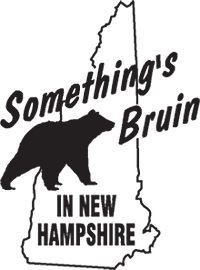New Hampshire Fish and Game – the folks who have to respond to complaints about nuisance bears – are not fans of backyard bird feeders. Fatty birdseed is like candy to black bears, so feeders lure them close to our homes, where complaints are more likely. This has gotten pretty common in large parts of New Hampshire; a bear came onto my porch a few years ago and in the process of swiping the bird feeder bent a thick metal rod in half.
Every year Fish and Game asks us to take down our bird feeders when bears become active in spring. Much to nobody’s surprise who is paying attention, that is happening earlier and earlier:
Although March 31 is the traditional deadline for ending winter bird feeding activity, more mild winters and the earlier arrival of spring conditions warrant modifications.“Den emergence by bears appears to be a couple of weeks earlier this year and the upcoming stretch of mild spring weather will cause bears to become active,” said Andrew Timmins, Bear Project Leader for the NH Fish and Game Department. “The strong spring sunshine, longer days and warmer temperatures stimulate many wildlife species, including hungry bears. As bears start to get active, let it serve as a reminder that it is time to put the birdfeeders away until next fall.”Reports of bear activity and sightings have become more frequent in recent days and many people are reporting seeing bears at their birdfeeders, according to Timmins.


 Return to the Concord Monitor
Return to the Concord Monitor
A couple of years back, we did the right thing and waited for it to get cold an snowy before we put up our feeders. We didn’t really pay attention when the weather went through a warm snap because we thought bears hibernated for the entire winter(*). One evening we heard a noise on the porch so I headed out the door. The second I got the door open, my wife shouted ‘BEAR!’…tooo late for me. Luckily there was a gate between me am Mr/Ms Bear and s/he had already headed up the hill where s/he waited for me to leave so s/he could return to eating. It was quite the fun evening of nature in the raw!
(*) Bears enter a state of torpor and will wake up and forage if the weather warms. We can expect later starts to the winter, more bears active during winter, and earlier springs as the earth warms…gonna be interesting.